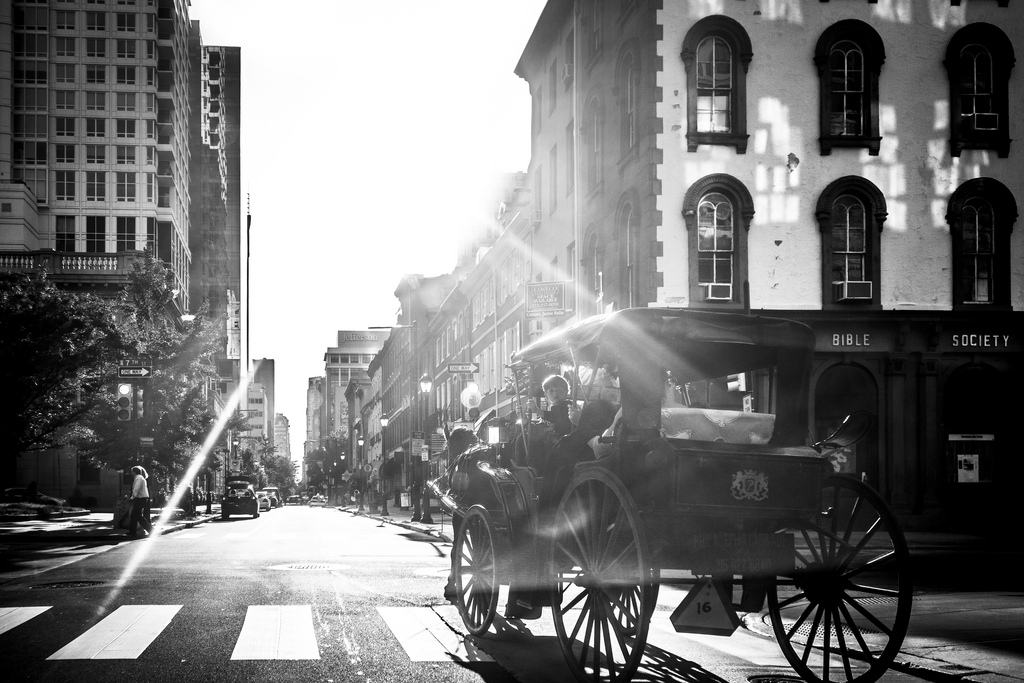Tough road ahead for improvement district in Washington Square West

A small group involved in floating a Neighborhood Improvement District in Washington Square West held its first community-wide meeting Tuesday night to discuss the proposal. Around 100 people showed up, and a majority—or at least the loudest—cried foul.
Whose idea was this? they wanted to know. What problems even need to be solved? How much are we being asked to pay?
A Neighborhood Improvement District (NID) is an area in which property owners pay an extra assessment on top of property tax for localized cleaning, lighting or security services or other quality-of-life improvements. See previous coverage of the Washington Square West NID here.
Tuesday’s meeting began with a presentation from the NID steering committee, composed of members of Washington Square West Civic Association and other local groups. The committee members stressed that no formal steps had been taken to create a NID; the meeting at hand was intended to get a read of the community’s attitude toward the idea.
Reed Lyons, an attorney and board member of the civic association, gave a hypothetical breakdown of how a NID might work. The numbers were based on a study that the committee commissioned from Econsult Corporation.
The area in question—roughly spanning Locust to South and Broad to 7th streets—contains around 2,800 properties. The total taxable value of those properties is roughly $1.25 billion. A typical home in the area is worth around $400,000, which means a typical property tax bill is roughly $4,950 each year. A NID assessment would be a percentage of each property owner’s tax bill.
Assuming a 2 percent assessment and an 80 percent collection rate, Lyons said, the NID could generate $264,000 per year by collecting around $100 a year from the typical property owner ($100 NID assessment per $400,000 of property value). At a 1 percent assessment with a 70 percent collection rate, it could collect $110,000 a year; a 3 percent assessment and 100 percent collection rate would generate nearly $500,000 annually.
But what would the money be used for?
Judy Applebaum, a former president of Wash West Civic and member of the NID steering committee, said that had yet to be determined. The idea came up, she said, because neighborhood residents have been saying for years they want cleaner, brighter and safer streets, and the small group of usual donors to WSWCA had been asking whether there wasn’t a way the financial burden could be spread to a wider swath of the community. Any NID programs would be based on a comprehensive survey of the community’s wishes, Applebaum said. If the NID moves forward, the community will be able to review the bylaws, operating budget, program expenses, and board of directors.
Several people in attendance suggested that Washington Square West is already well taken care of by volunteers; the NID is “a solution in search of a problem,” said one attendee.
Much of the trepidation at the meeting seemed to stem from a quirk of the state law that authorizes NIDs. Once a bill is introduced into City Council proposing a Neighborhood Improvement District, it can only be defeated if 51 percent of the affected property owners—or owners representing 51 percent of the property value—vote to kill the bill. It requires majority opposition to be stopped, rather than majority support to move forward, like most elections.
Virtually all in attendance, including members of the NID steering committee and Councilman Mark Squilla, felt that the reverse election was unfair.
“The way [the law] is written,” Squilla said, “once it gets introduced, it’s very difficult to defeated, even though it has been defeated.”
Two NIDs have been defeated in Philadelphia recently, one in the area surrounding the Reading Viaduct in Callowhill, and another near Temple University. To date, there are no Neighborhood Improvement Districts in the city, though there are around 15 Business Improvement Districts. The Center City District, a BID, now assesses residents as well, though at a lower rate than businesses, according to Denis Murphy, the BID program manager for the Commerce Department.
Councilman Squilla said that the reverse election creates “animosity between the people who came up with the idea and the community, who think they’re going to get something shoved down their throats.”
Councilman Squilla said that the NID steering committee had committed to holding at least one more meeting and then conducting some type of straw poll to try to gauge the whole community’s interest. He didn’t know whether the poll would be conducted via mail, flyering, the Internet, or something else.
He also said his office would engage other Council members to discuss lobbying Harrisburg to review the NID law.
“What we emphasize again and again,” said Denis Murphy, “is that if there’s significant and widespread opposition, you need to talk to people to convince them of the value of [a NID].”
Councilman Squilla said that although the law requires majority opposition for a NID to be defeated, he would refrain from introducing any legislation unless he’s convinced that the idea has widespread support from the community.
There’s no way to know at this point whether the group that showed up for Tuesday night’s meeting is an accurate reflection of the Washington Square West community. But if it is, there may be another stillborn NID in Philadelphia.
WHYY is your source for fact-based, in-depth journalism and information. As a nonprofit organization, we rely on financial support from readers like you. Please give today.



